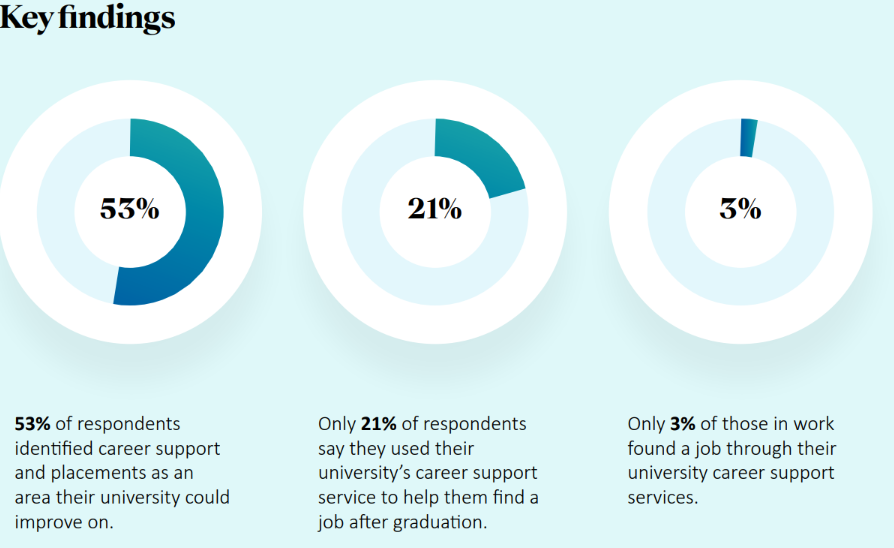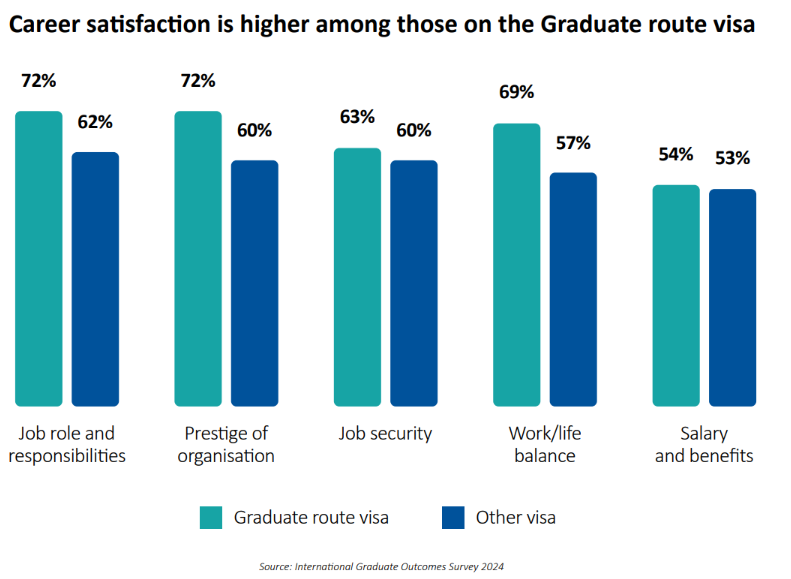
A new report, produced by QS and Universities UK International (UUKi), details the perspectives and experiences of over 10,000 international graduates who graduated from 37 UK universities, plus British Council and NISAU alumni, over the past six years.
The key learnings and recommendations
Below, an excerpt from the report details the five key learnings. Read the full report for more.
The outcomes reveal deep insight for individual institutions, which has been shared with them directly, but this report unveils detail on a range of important universal themes, from which five key learnings stand out.
1. Students are drawn to the UK by high quality universities
59% of respondents chose to study in the UK because of the perceived quality of the study experience.
The credentials and appeal of UK universities collectively remain undiminished. The majority of respondents report that the reality lives up to the expectation.
2. Universities need to improve career support for international students
53% of respondents identified career support and placements as an area their university could improve on.
Whilst international graduates have been able to leverage the prestige of credentials from the UK’s institutions, the practical support they received was widely reported as an area for improvement.

3. The Graduate route visa enables students to continue to contribute to the UK economy
72% of those on the Graduate route visa were satisfied with their job role and benefits, compared to 62% on other visas.
A study from UUKi, HEPI and partners last year revealed that just one cohort of international students contribute £37.4 billion to the UK economy before they graduate. Insight here reinforces HEPI’s recent report, illustrating that the Graduate route visa provides a means for their economic contribution to continue after graduation.
4. Graduates support key sectors of the UK economy
60% of respondents still living in the UK surveyed work in small- to medium- sized organisations with the highest percentage employed in healthcare and education.
The data shows that international graduates are choosing to work in sectors, as well as small businesses, where skills and capacity gaps are widely and persistently reported.
5. Graduates continue to support the UK on returning home
For 71% of respondents, studying at a UK university means they feel a close connection with the UK and 57% say they’re more likely to do business with the UK because of their degree.
Of the large number of graduates surveyed who had returned home, most have done so having formed a deep connection with the UK and with a huge potential of contributing to UK prosperity for generations to come.
Key recommendations
1. Improve career support service offerings
Support international students in their early career journey, both in the UK and in their home countries. Raise awareness of the breadth of services and support offered by career service teams and help more international graduates benefit from the guidance, training and advertised job roles available.
2. Collaborate with employers to ensure skills are embedded in the curriculum
Improving your employer engagement will help deliver your career support services are preparing students with the skills that employers value most, and will ensure that your university develops the capabilities that the global economy needs to support progress and prosperity.
3. Work with the government to realise the benefits of the Graduate route visa
The data shows that the Graduate route visa is an important factor in the UK’s competitiveness as a study destination. Without a strong post-study work offer, UK universities, campuses and cities will attract fewer international students – and UK campuses, cities, universities and the UK economy will be worse off in every sense.

4. Leverage alumni communities
Share their stories with future students and support them in their aspirations to become lifelong partners to the UK. Graduates from India and China are more likely to be advocates for the UK than graduates from smaller markets. Universities should ensure they’re supporting alumni communities globally to nurture their connection to an institution, city and the UK.
5. Champion the diversity of student and faculty communities
Ensure international students know that they are welcome in UK cities and on UK campuses. The ability to celebrate diversity and make international students feel welcome is a clear strength of the UK sector.
We also hosted a webinar with key speakers:
- Jessica Turner, QS Chief Executive Officer,
- Jamie Arrowsmith, UUKi Director,
- Harry Anderson, UUKi Deputy Director (Policy & Global Engagement)
- Sanam Arora, Founder and Chair, National Indian Students and Alumni Union UK
- Professor Karen O’Brien, Vice-Chancellor, Durham University
Moderated by James Coe, Associate Editor at Wonkhe, our panel of experts discussed these key findings, recommendations, and the report in more detail. Watch the recording on LinkedIn.



